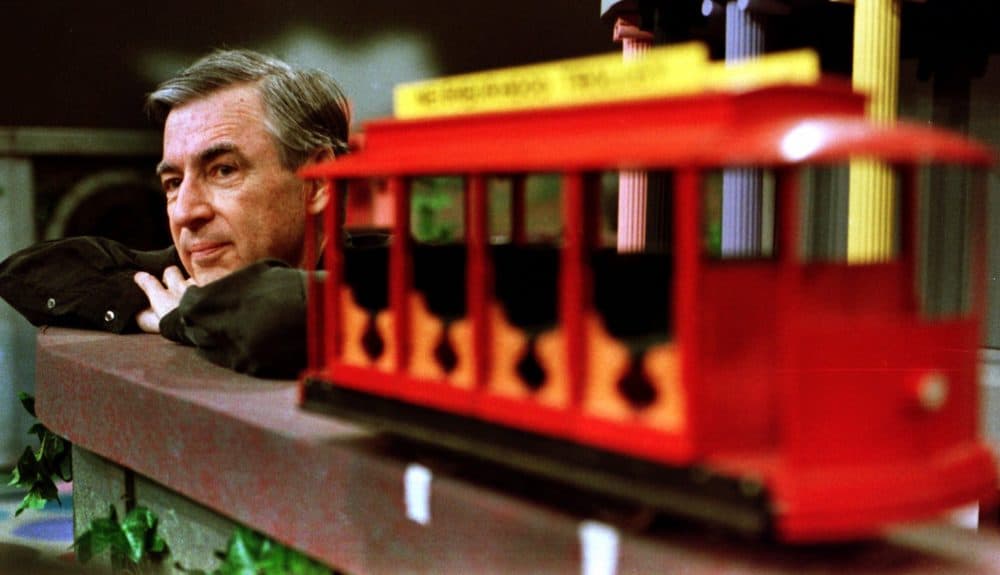Advertisement
Pittsburgh Synagogue Attack Took Place In Mister Rogers' Neighborhood

The mass shooting that killed 11 people at a Pittsburgh synagogue over the weekend took place in the city's Squirrel Hill neighborhood, where Fred Rogers lived while making his children's show, "Mister Rogers' Neighborhood."
Rogers grew up in the Pittsburgh suburb of Latrobe, Pennsylvania, and moved to Squirrel Hill when he got married. He enjoyed the community's diversity, says Roberta Schomburg, executive director of the Fred Rogers Center, and learned Hebrew while living there.
"He loved walking down the streets and noticing the trees and the various temples and synagogues and churches that all made him feel at home, the bakeries, the delicatessens," Schomburg tells Here & Now's Jeremy Hobson. "He often commented that he could hear Yiddish and Hebrew and a dozen other languages spoken as he walked down the street."
In response to the shooting, Rogers would want people to be constructive and look out for one another, Schomburg says.
"Fred Rogers said that we have one life to live on this earth," she says, "and we can spend that time encouraging people to demean this life and be hateful, or we can spend that time creating encouragement and spaces where children and others can use this life in very meaningful and creative ways."
Interview Highlights
On how Squirrel Hill influenced the neighborhood where the show was set
"The Mister Rogers neighborhood I think certainly had some of the philosophy of the Squirrel Hill neighborhood. I think that it was a fantasy neighborhood, the neighborhood of make believe. But I think what came through was the way people cared for one another, which certainly I think was reflected to him through the Squirrel Hill community and probably also the Latrobe community where he grew up."
"I think he would ... say we need to turn to our neighbors. Neighbor in the greatest sense of the [word] — everyone who lives on this planet is a neighbor."
Roberta Schomburg, on what Rogers' advice might be after the shooting
On what Rogers taught kids and grown-ups about how to handle difficult emotions
"I think one of the things that he taught us all is that it's alright to have these feelings: to feel sad and to feel angry and to be afraid, and there's nothing wrong with those feelings. But that it does help if we can talk to someone. So for children, the message was that grown-ups are there to listen. And I think the message to grown-ups [was], listening to the children is very important, and letting them tell us what they understand about it and helping them to learn to make sense of what they see.
"One of the things that Fred often said was that his mother always told him in times of crisis to 'look for the helpers.' And I think certainly in the Pittsburgh area what we saw were all the helpers: the emergency response team, the police officers, the firefighters, the ambulances, the doctors, the nurses — everyone has surrounded this community with caring. That's one of the things I think we can help children recognize and identify with, so that they identify with the helpers and not those who cause destruction."
Advertisement
On what kind of advice Rogers might give parents about talking with their kids after the Pittsburgh shooting
"One of the things that probably is helpful is for all of us to find time and space to be together away from media, where we can talk and share our comforting of each other. So I think that's an important thing. But I also think one of the messages that Fred Rogers gave was that we have to figure out how to make goodness attractive. I think that dwelling on the violence, of course, undermines that message. So looking for the helpers helps us see the good that is still around us."
On what Rogers might think of what happened in his neighborhood
"I think he would be horrified by what happened, and he would be concerned about the children, he would be concerned that they may be afraid and they may be angry, and they may see these reactions in the adults. So it's important for us to help children learn that the feelings are normal and manageable, but find ways to talk about it and find ways to express anger and find ways to express sadness in ways that are not harmful to other people.
"I think he would also say we need to turn to our neighbors. Neighbor in the greatest sense of the [word] — everyone who lives on this planet is a neighbor — and reach out and provide support to our neighbors, to people of all backgrounds, of all faiths, of all races, so that we can live together on this earth in very productive ways."
This segment aired on October 30, 2018.